Cultivated music, art music, serious music … shifting from one of these messy labels to another usually has one aim: to avoid the problematic “classical music”. Today this misleading term covers everything that was heard in medieval churches, in the course of Baroque festivities, in the age of bourgeois revolutions and at experimental concerts that saw shoes being thrown at the performers. Brno happily recalls visits here by Wolfgang Amadeus Mozart, Franz Liszt and Bedřich Smetana, short as they were. But it also remembers the Hollywood film music celebrity Erich Wolfgang Korngold, who spent his earliest years in Brno. Brno might appear to be a city of brief sojourns, were it not for Leoš Janáček, who made it his home and in the course of the past forty years has become one of the world’s most frequently performed composers. But the musical history of the city mirrored the turbulent political changes in the nineteenth century and drew on the enormous energy released by the creation of a free Czechoslovakia in 1918: never since then has its progressive character vanished completely.
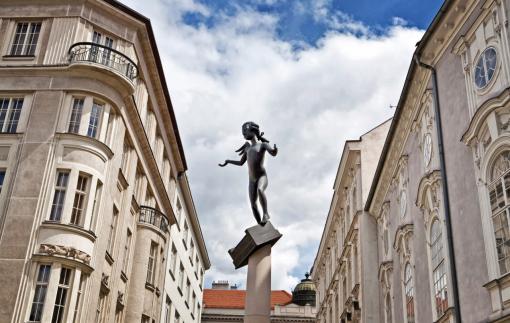 Statue of Mozart by Kurt Gebauer in Zelný trh. Photo: Pocket media/Monika Hlaváčová
Statue of Mozart by Kurt Gebauer in Zelný trh. Photo: Pocket media/Monika Hlaváčová
Houses of (Musical) Prayer
For hundreds of years the city’s skyline has been dominated by the Cathedral of SS Peter and Paul, situated on a hill overlooking the city, and the Church of St James at its very heart. These two churches housed schools where young boys were also trained in singing. Another important musical centre was the Basilica of the Assumption of Our Lady in Mendel Square. This was founded in 1323 by Queen Elizabeth Richeza, quite unaware that many centuries later Brno’s greatest musical figure, Leoš Janáček, would begin his musical career here.
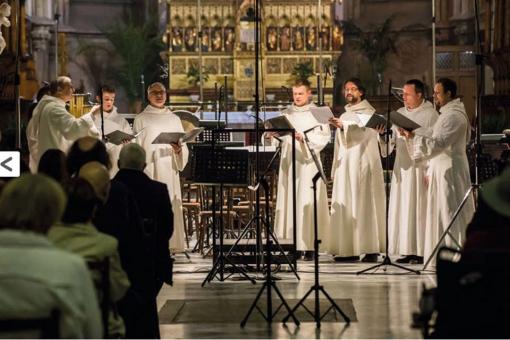 Schola Gregoriana Pragensis´ Holy Week Meditations at the Easter Festival of Sacred Music. Photo: Brno Philharmonic
Schola Gregoriana Pragensis´ Holy Week Meditations at the Easter Festival of Sacred Music. Photo: Brno Philharmonic
Liturgical singing is not what we today term “musical life”, and has nothing in common whatsoever with concerts as such. Nevertheless, musical activity in those longgone days often anticipated social development. Paintings by leading medieval and Renaissance artists were probably not to be seen in Brno’s churches, but music by the very best composers could be heard there. We have proof of this from the Renaissance period. Worshippers in Brno listened to the Renaissance polyphony of Josquin Desprez, though the historical sources don’t give the names of its interpreters. But they do indicate that there were already close links between Brno and Vienna.
One of the greatest musicians of the day, Alessandro Striggio, was enticed to Brno by the Habsburg emperor Maximilian II, who was attending a session of the Moravian Estates here. Striggio wished to present the emperor with his forty-voice mass Ecco si beatigiorno. A second great Renaissance composer was present in Brno as a member of Maximilian’s retinue - Jacob Handl Gallus. Many works found in the archives of the city’s churches can be heard in Brno today as part of the annual Easter Festival of Sacred Music.
From Baroque Organ to the Twenthieth Century
Even after the arrival of the Baroque in Brno, the local churches remained the city’s musical centres. By this time the Jesuits were established here, and in 1743 they had the city’s second organ installed in their church; it remained there until destroyed by bombs in 1944. Today the city’s most modern organ, inaugurated in 2014, with the cost covered partially by the “Opera for Brno” public funding campaign, can be heard there.
It was musicians from St James’s Church who formed the core of the orchestra that accompanied the eleven year old Wolfgang Amadeus Mozart when he performed here in 1767. His concert is commemorated by a statue by Kurt Gebauer in front of the Reduta theatre, where the young Mozart appeared.
Without Reduta, the subsequent musical life of Brno would have been unthinkable. It was the site of the first opera performances in Brno but also a suitable space for concerts. Much later, operetta found a home here, and chamber concerts and operas have continued to take place here down to the present. But of course the hall is too small for concerts by today’s firstrate musicians: the size of the public and its diversity have multiplied exponentially since the eighteenth century.
While not even the Janáček Theatre, which can seat more than one thousand spectators, could answer the demand for tickets to a concert by Valery Gergiev and the London Symphony Orchestra in 2013, the much smaller Reduta was large enough for a charity concert by Franz Liszt and the appearances of Clara Schumann and of Johannes Brahms with the violinist Joseph Joachim. But far more important than visits by outstanding musicians was the city’s everyday musical life, which took on enormous momentum after 1860, when it became possible to establish associations: this was an important stimulus to the emergence of what we now term civil society.
Social Gatherings, Associations and the Struggle Between Nationalities
At the time, Brno was run by its German speaking citizens, but in the years immediately following 1860, the Czech and German speakers were not yet in open conflict. This was reflected in music. The brilliant pianist Agnes Tyrrell performed in events organized by the newlyestablished Brno Musikverein as well as at Czech social gatherings. It was only several decades later that Czech and German musical societies began to move apart, deliberately undercut one another and even “punish” musicians for taking part in events organized by the “competition”. Out of the chamber music tradition there emerged the Neruda family string quartet, the precursor of the much later Moravian Quartet, the Janáček Quartet and many others.
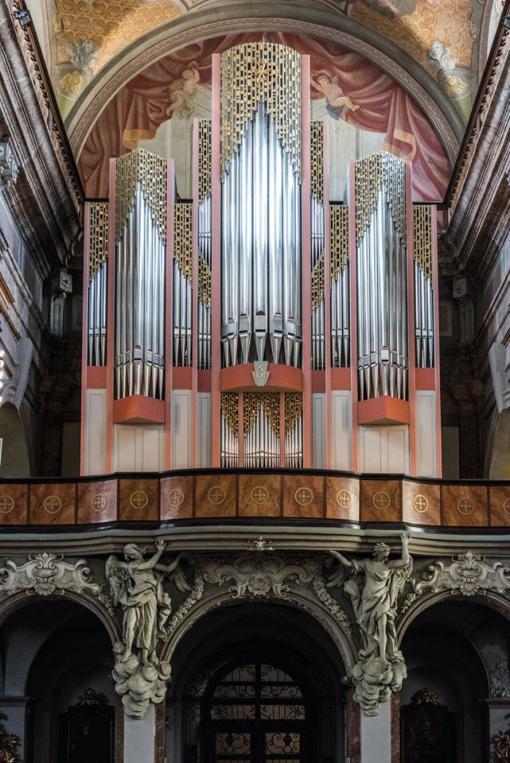 Concert organ in the Church of the Assumption of Our Lady. Photo: Pocket media/Ivo Dvořák
Concert organ in the Church of the Assumption of Our Lady. Photo: Pocket media/Ivo Dvořák
One landmark was the establishment of Brno Beseda in 1860. Today one of the oldest Czech choirs, it was founded by the composer Pavel Křížkovský, an Augustinian and the first teacher of Leoš Janáček, who led the Brno Beseda from 1876 to 1884. The Brno Beseda was not only a choir, but also a platform for organizing symphony concerts. As conductor, Janácek raised musical life to a high level. He was also behind the creation of an Organ School in 1906; in 1919 it was transformed into the Brno Conservatory.
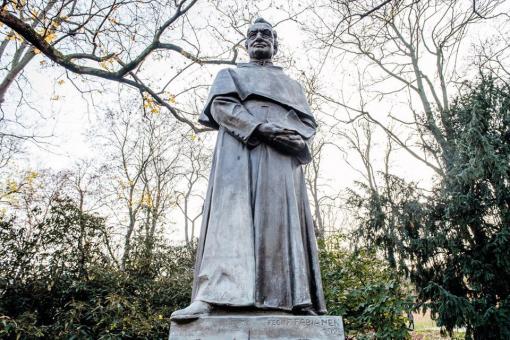 Pavel Křížkovský’s statue in the park beneath Špilberg. Photo: Pocket media/Ivo Dvořák
Pavel Křížkovský’s statue in the park beneath Špilberg. Photo: Pocket media/Ivo Dvořák
Brno Beseda often held concerts in the pavilion for hosting social events in the city park, Lužanky. After 1873 it and many other associations were able to move to the new Czech social and cultural centre Besední dům, housed in a neo Renaissance building designed by the architect Theophil von Hansen, later responsible for the Vienna Musikverein. By this point, attending a concert there was a proclamation of one’s Czech identity. The creation of Besední dům served as a stimulus for the establishment of the Deutsches Haus as its competitive German counterpart.
Besední dům soon became the centre of Czech musical and social life in Brno. It was on the steps of Besední dům that a young worker, František Pavlík, was fatally wounded in 1905 in a forcibly suppressed demonstration calling for the establishment in Brno of a second Czech university an event commemorated by Janáček in his piano Sonata I. X. 1905, titled “From the Street”. And it was from the balcony of Besední dům that the creation of an independent Czechoslovakia was proclaimed in October 1918.
Brno: Modern, at War, Communist… and making Music
Following the end of World War I, Brno began to develop rapidly and to transform itself into a modern, Functionalist city. The conductor František Neumann moved to Brno; his main focus was on opera, but he also programmed symphony concerts and introduced the first subscription series of concerts. The Brno Radio Orchestra, founded by Janáček’s student Břetislav Bakala, followed in Neumann’s footsteps. Thanks to Bakala, the Brno public was able to enjoy outstanding performances of the classics as well as works by contemporary Moravian composers. Bakala continued with this consistent promotion of Czech composers even during World War II.
The war sealed the fate of the composer Pavel Haas. His natural talents made him one of the greatest composers ever born in Brno, but unlike his more famous brother Hugo, he failed to emigrate before the German occupation and was murdered in Auschwitz. At the beginning of the war, another highly talented Brno composer, Vítězslava Kaprálová, died in France. And long before that, another native of Brno, Erich Wolfgang Korngold, had left behind Brno and even Europe. In the USA he became a leading composer of music for Hollywood films, twice winning an Oscar.
Ten years after the end of World War II the radio orchestra and the Brno Region Symphony Orchestra merged to form what is now the Brno Philharmonic; its first concert took place on 1 January 1956. Indirectly, Bakala’s work influenced the world famous Janáček specialist Charles Mackerras, who conducted frequently in Brno.
The Brno Philharmonic is at the heart of Brno’s musical life, as is the Moravian Autumn festival, now more than fifty years old. Among its legendary events was the Czech premiere of Olivier Messiaen’s Turangalîla symphony in 1972 in the presence of the composer himself.
Past and Present in a Unity of Time and Place
The performance of Turangalîly confirmed Brno’s reputation as a city of progressive musical thinking. In recent years the Brno Philharmonic has continued this tradition through its festivals and the programmes for its subscription series of concerts. Most recently this commitment was reflected in the selection of Dennis Russell Davies, an outstanding specialist in contemporary music and an experienced interpreter of Beethoven and Bruckner, as its new Chief Conductor. The more experimental trends in contemporary music are reflected in the Exposition of New Music and Meetings of New Music Plus festivals.
Since 1947 the Janáček Academy of the Performing Arts (JAMU) has been a fertile hotbed for contemporary musical thinking. In the Communist era it was a haven for students who wanted to be in touch with Western trends; for this, an immense debt is owed to the composers and teachers Miloslav Ištvan and Alois Piňos. Both were members of the composers’ group Skupiny A and the discussion club Camerata Brno, whose activities were more or less taken over later by the multigenre Sdružení Q.
Skleněná louka is a special case. Under Zdenek Plachý, avantgarde musicians from the whole world met up with each other at this centre, and improvisational evenings and interpretations of graphic scores still take place there today. An exceptional musical phenomenon is the Central European percussion instrument group Dama Dama, founded in 1990. The Brno Contemporary Orchestra under Pavel Šnajdr is now able to offer subscription series of contemporary music.
The Baroque instrument Czech Ensemble Baroque, led by Roman Válek, focuses on early music, in particular by the Czech Baroque composer František Xaver Richter. The Concentus Moraviae festival is also heavily oriented towards early music; for more than twenty years it has hosted outstanding interpreters from around the world. The above mentioned forty voice mass by Alessandro Striggio was part of one of its programmes. A teaching basis for early music exists at JAMU, where the harpsichord and organ player Barbara Marie Willi established the Department of Organ and Early Music Performance in the Czech Republic in 2014. In a similar fashion, she founded the first subscription series of early music concerts under the witty title BMW presents.
Advancing Steadily in its own Path
Brno has created such a distinctive musical world that at times there has even been serious talk of the “Brno school of composition”. One of its essential features is collecCultivated music, art music, serious music … shifting from one of these messy labels to another usually has one aim: to avoid the problematic “classical music”. Today this misleading term covers everything that was heard in medieval churches, in the course of Baroque festivities, in the age of bourgeois revolutions and at experimental concerts that saw shoes being thrown at the performers. Brno happily recalls visits here by Wolfgang Amadeus Mozart, Franz Liszt and Bedřich Smetana, short as they were. But it also remembers the Hollywood film music celebrity Erich Wolfgang Korngold, who spent his earliest years in Brno. Brno might appear to be a city of brief sojourns, were it not for Leoš Janáček, who made it his home and in the course of the past forty years has become one of the world’s most frequently performed composers. But the musical history of the city mirrored the turbulent political changes in the nineteenth century and drew on the enormous energy released by the creation of a free Czechoslovakia in 1918: never since then has its progressive character vanished completely.tive composition, the most popular example of which is the 1995 chamber opera The Cage Affair, or Annals of the Avantgarde Opened Wide. Three composers were involved in its creation: Alois Piňos, Ivo Medek and Miloš Štědroň.
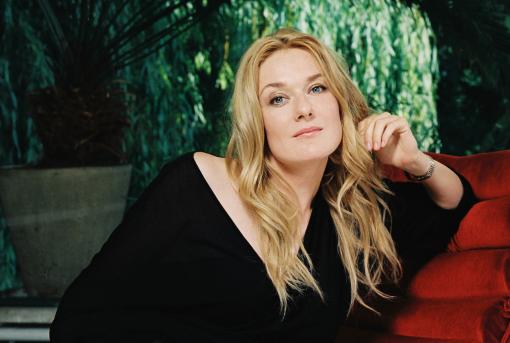 Mezzo Magdalena Kožená in the Villa Tugendhat. Photo: International Slavic Music Centre Brno
Mezzo Magdalena Kožená in the Villa Tugendhat. Photo: International Slavic Music Centre Brno
Everything in Brno’s musical life comes together in The Cage Affair. One of the characters is Leoš Janáček, who is visited by the American avantgarde composer Henry Cowell. Bits of Moravian folk music pop up. Cowell plays on the piano with a ruler and Janáček’s dog Čipera gets into the act. The dog’s role is in Baroque opera style, and was originally written for the mezzosoprana Magdalena Kožená, a native of Brno, where she also began her career. Čipera bites Cowell, who contracts rabies and infects his student John Cage. Cage’s legendary composition 4’33’’ closes the opera. Moravian folk tunes, Janáček, worldfamous avantgarde figures, and composers and a singer that are the flower of Brno’s musical life all of this together, in an ideal production, concentrated in a single place.
Pavel Haas: Prophet of Optimism and the Anguish of War
When visiting the Jewish cemetery in Brno, few people forget to seek out the grave of the famous Czech interwar actor and film star Hugo Haas. Considerably fewer people standing by his grave remember his older brother Pavel Haas, who, unlike Hugo, failed to flee the country before the Nazi occupation. In 1942 he was deported to Terezín; in 1944 he met his end at Auschwitz.
Pavel Haas was one of the most talented composers in the postwar generation, who rejoiced at the end of World War I, suffered through the Depression, and experienced the horror of the onset of World War II. In the interval between the wars, however, they enjoyed a period when Czechs, Germans and Jews mixed together and influenced each other mutually, in music as in life.
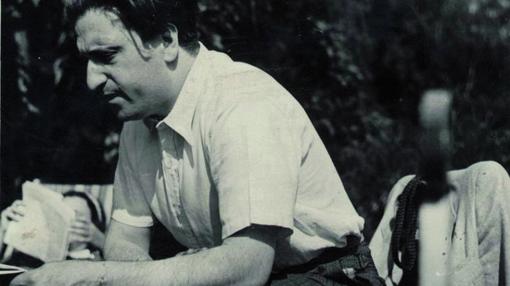 Pavel Haas
Pavel Haas
Haas was a typical child of his era. He attended German primary school and Czech secondary school; his music includes typical Jewish melodies, but also echoes of the twelfth century St Wenceslas Chorale. The latter is most noticeably present in his Suite for Oboe and Piano, which he wrote in 1939 in the oppressive atmosphere of the beginning of the occupation, and in which a fifteenth century Hussite chorale also appears.
Haas’s most popular work is his String Quartet No. 2, titled “From the Monkey Mountains”, a piece driven by the dance rhythms of the age. His masterpiece is the tragicomic opera The Charlatan (1937). Pavel Haas’s death meant the loss of a composer who was undoubtedly Leoš Janáček’s most talented student. In 2000 he was named an honorary citizen of Brno.





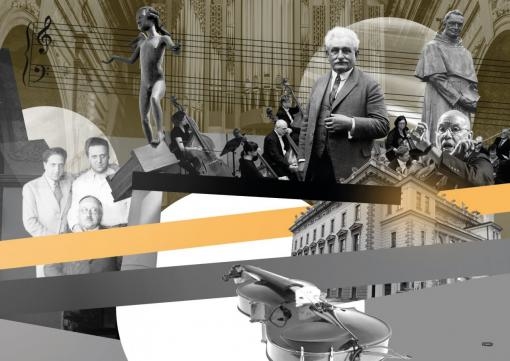


























No comment added yet..